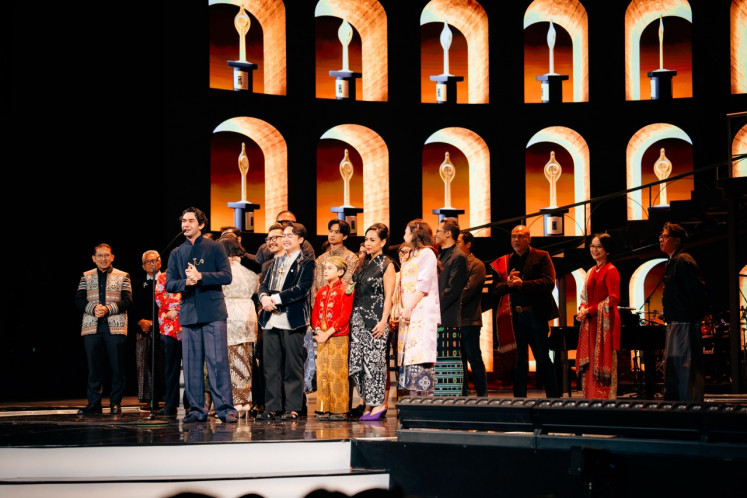Popular Reads
Top Results
Can't find what you're looking for?
View all search resultsPopular Reads
Top Results
Can't find what you're looking for?
View all search resultsCibulao farmers turn coffee plants into conservation movement
Change text size
Gift Premium Articles
to Anyone
T
hree siblings have grown coffee in Cibulao village in the Puncak area of Bogor, West Java, with the humble purpose of protecting the forest as well as enjoying good coffee.
All working in the infrastructure division at the Ciliwung tea plantation, Kiryono, 38, Jumono, 35, and Dasim, 25, are residents of Cibulao.
Some 138 family units comprising around 500 people live in the village. It is situated in the middle of the plantation run by PT Sumber Sari Bumi Pakuan.
“Actually, the first one who planted coffee in the forest owned by [state-owned forestry company] Perhutani was my father, Nardi, who also worked at the Ciliwung tea plantation. He initially planted 50 coffee tree seeds in 1998 as he wanted to make use of the forest that was previously eroded. The seeds came from Temanggung. [Such an activity] was deemed illegal at the time but most locals here had cut down trees to create vegetable farms,” said Kiryono.
Unfortunately, many of the coffee seeds planted did not survive, and after his father died Kiryono and his two brothers carried on planting coffee. In 2007, they met Perhutani officials and a year later were given a cooperation certificate by the company to plant coffee as tumpang sari (intercropping) among forest trees like rasamala, puspa and saninten, in order to protect the forest and prevent illegal logging.
Read also: Crazy about Indonesian coffee? Here are the basics of java
“When we received the Perhutani certificate, we were laughed at by our neighbors in Cibulao, since they believed making money from coffee was not promising. We bought robusta coffee seeds for 250 trees from Jonggol at the time,” said Kiryono.
Many challenges were faced by the siblings; for three years their coffee harvest was not successful, and the farm group they established also dispersed. Many of the big trees in the forest were also stolen to be used as firewood and to make animal cages up until 2013.
Finally, in 2016 Jumpono was named head of the Green Cibulao Forest Farm group. Representing Bogor regency, the group joined an Indonesian specialty coffee competition in Aceh and went home as the national champion as Cibulao’s robusta coffee was considered to have a strong flavor and aroma and hence got a very high score of 84.9. The competition itself was joined by 160 participants and had a jury that hailed from 16 countries.
After joining several coffee competitions in regions like Aceh and Jember, Cibulao coffee has finally been recognized nationally. If in 2009 they sold 5-10 kilograms of green bean robusta coffee in Cianjur Market for Rp 15,000 (US$1.09) per kg, now they have marketed their coffee to several cafes in Bogor for Rp 60,000 to Rp 70,000 per kg. During the coffee harvest in 2016, Kiryono was said to have earned up to Rp 60 million.
Kiryono currently manages a 5-hectare coffee plot, while Jumpono runs a 3-ha plot and Dasim 1 ha. As time has gone on more people have joined their Green Cibulao Forest Farm group and it now has 38 members and deforestation has been reduced by up to 95 percent.
“Despite all the challenges we faced, we did not give up, since we wanted to plant coffee to protect the forest; and so that we could freely drink coffee. If we are now successful, it is merely a bonus for our hard work,” said Kiryono. (kes)











